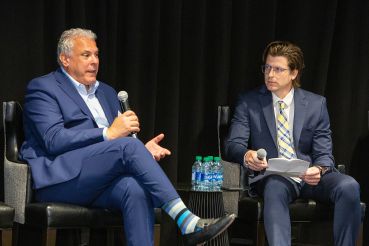Dodd-Frank’s Effect on CRE at Issue During House Subcommittee Hearing
By Carl Gaines July 10, 2012 1:20 pm
reprintsOn the heels of last month’s appearance of JP Morgan Chase CEO Jamie Dimon, the House Subcommittee on Capital Markets and Government Sponsored Enterprises welcomed several players from the world of commercial real estate Tuesday.
They testified at a hearing entitled “The Impact of Dodd-Frank on Customers, Credit, and Job Creators” that seemed to focus more on the overall impact of specific provisions within Dodd-Frank on the capital markets.
 Witnesses, including CRE Finance Council president Paul Vanderslice and CalPERS senior portfolio manager Anne Simpson, took competing views in their testimony before the House Subcommitttee on how Dodd-Frank regulations will affect the commercial real estate markets.
Witnesses, including CRE Finance Council president Paul Vanderslice and CalPERS senior portfolio manager Anne Simpson, took competing views in their testimony before the House Subcommitttee on how Dodd-Frank regulations will affect the commercial real estate markets.
Ms. Simpson, from CalPERS, the largest U.S. pension fund with $232 billion in global assets, detailed how the financial crisis had negatively impacted the fund, sweeping away $70 billion in assets. “We simply cannot afford another assault on her fund,” Ms. Simpson said. She added that a more effective early warning system was needed and that CalPERS fully supports facets of Dodd-Frank, such as the Volcker Rule, which would curtail banks’ speculative activities.
For his part, Mr. Vanderslice, a managing director at Citigroup (C) Global Markets who was named to head CREFC in June, took issue with the premium capture cash reserve account provision. PCCRAs, under the credit risk retention rule, would call for the creation of accounts to cover losses resulting from securitizations. The Mortgage Bankers Association, the CCIM Institute and CREFC have all spoken out against this provision.
Mr. Vanderslice said that a survey of CMBS loan originators showed that its implementation would decrease originations and that 78 percent of the CREFC board, not surprisingly, believed that it would hinder CMBS as well. He warned that with $2 trillion in commercial real estate debt eventually coming due, CMBS was required to fill the gap left after portfolio lenders and other avenues of financing are exhausted.
“PCCRA is the stumbling block that we’re wrestling with right now,” he said
Other witnesses included Thomas Deas, from the National Association of Corporate Treasurers and the U.S. Chamber of Commerce; Tom Deutsch, from the American Securitization Forum; Dennis Kelleher, from Better Markets; and Thomas Lemke, from the Investment Company Institute.
Dissection of Dodd-Frank continues Wednesday with a hearing entitled “The Impact of Dodd-Frank’s Home Mortgage Reforms: Consumer and Market Perspectives.”
cgaines@observer.com


